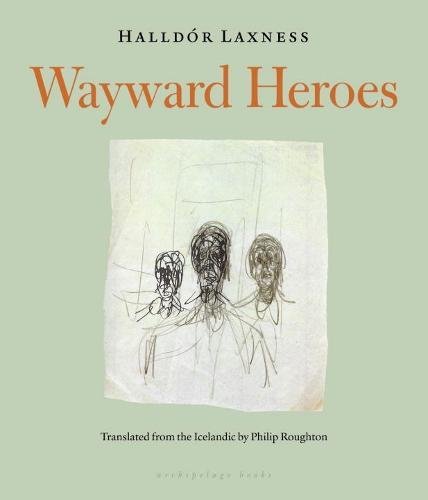Wayward Heroes
by Halldór Laxness, translated by Philip Roughton
reviewed by K. B. Thors
Wayward Heroes, the political roast by Halldór Laxness, has finally been translated directly from the Icelandic into English by Philip Roughton. Published by Archipelago Books, the Nobel Laureate’s stab at a sardonic Saga for and of the Ages has all the ingredients of literary knighthood: friendship, exile, poverty, obsessive quests, and extravagant pathetic human ecology. Set about one thousand years ago, a critique of twentieth-century indecency underpins this brutal story of Vikings and saints in a book that plays with both the role and style of saga culture.
Þorgeir Hávarsson and Þormóður Kolbrúnarskáld are an archetypal duo: warrior and poet, sworn brothers. They dream of glory and travel the world, a skaldic twist on Don Quixote and Sancho Panza. Þorgeir is a hero of unrivaled courage, touted with sarcasm—instead of genius Iberian slapstick, he proves his manliness by slaughtering innocent civilians. In lieu of Sancho’s practicality, Þormóður is a hero’s attendant skald, destined to immortalize Þorgeir’s gallant deeds in verse—if he can curb his skirt-chasing tangents.
The original Gerpla was published in Iceland in 1952, three years before Laxness was awarded the Nobel Prize. His lack of English publications following the post-WWII success of Independent People is a blacklisting saga in itself, encompassing his connections to Moscow, his criticism of the US military base at Keflavík and the American and British occupation of Iceland during WWII, and J. Edgar Hoover’s attempts to prevent American royalties from funding leftist organizations abroad. Taking aim at authority, nationalism, and the cultural traditions that bolster their claims, Gerpla is a reproach of ancient and modern fall-in-line attitudes. Armies are pawns in the game of wealth and heroes are mercenaries, navigating religions like trade routes. Christian nobility requires soldiers of God, so Vikings splash themselves with water—baptism makes for righteous pillaging. Dark humor permeates the free-for-all: “Killers with tangled locks and unkempt beards donned bishops’ miters, or adorned their heads with gold lace and other diadems of abbesses.” Peasants fight warriors with bludgeons and knitting needles, proving that “the fear that a land’s rulers have of foreign conquerors is slight compared to their fear of their own subjects.”
Ships and cathedrals are built and torched—it’s prime time in the chess game of world history. In this pivotal chapter of Christendom, the kingdom of heaven is another realm to be ruled. Finding it “quite troublesome that the bishops should be the only ones capable of interpreting the will of Christ in matters of greatest interest to a warlord,” King Þórkell tactically “declare[s] his intent to appoint a bishop as his right-hand man.”
These players understand the importance of who lives, who dies, who tells your story. Þorgeir vows to serve King Ólafur of Norway, later Saint Olaf, as the narrator acknowledges the origin tale at hand: “Those who bestow posthumous glory on kings also rewrite the stories of their lives, and thereby create saints for generations present and future.” Þormóður abandons his family to find Olaf and recite the lay he has written in praise of Þorgeir. Literary self-referentiality abounds as the narrator describes, in historically accurate yet sidelong tones, “skulls of saints, the sources of numerous outstanding miracles … seen by us, who, in our great poverty, have put together this little book.”
Þormóður’s mission takes him to Greenland and beyond, approaching the edge of the Northern Sea, “the regions lying closest to Ginnungagap, the home of the frost giants, where there is nothing but ice and darkness.” The reader is privy to lore about “the troll races and sorcerers that the Greenland colonies called skraelings,” who take Þormóður in after he attacks them. As he recovers from exposure and frostbite, Þormóður, like his countrymen, “found it particularly bizarre that this race had no weapons and no knowledge of the arts of manslaughter and murder,” yet “always had an abundance of food, in both good and bad years.” Social commentary runs deep as Þormóður clings to his mission, only to find that by the time he reaches Olaf, the cultural tide has turned: “The Norwegians feel quite strongly that they can do without any long, complicated poems croaked out ad infinitum by a beggarman from Iceland.”
An impressive translation of eleventh-century diction steeped with kennings, Wayward Heroes is a journey in its own right, though its satire will land hardest for those familiar with skaldic tropes. The cautionary tale of olden times when “upstanding men averted their eyes from enormities or injustice” so that “malefactors and cowards would indeed hold their heads high in the North, leaving skalds without matter for their voices,” disturbs today’s reader through sustained, timely apprehension. The skald is not quieted. Delayed, or subject to language barriers, perhaps.
Published on September 20, 2017

